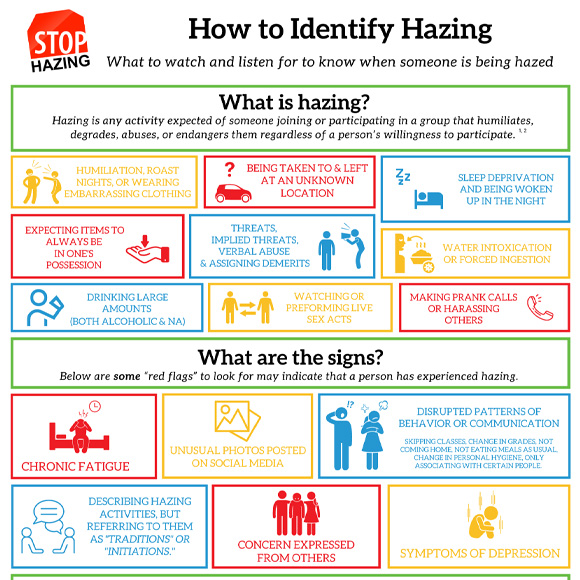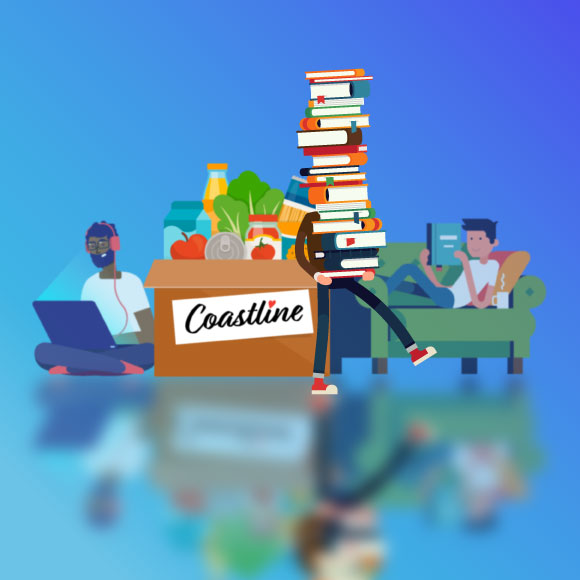Working together to provide welcoming and holistic student support services that are centered in equity.
Office of the Dean of Students
Dr. Leighia Moore-Fleming directs the Office of the Dean of Students (DOS) which includes these areas: EOPS/CalWORKS/NextUp Care, Mental Health, Student Life, Student Equity, Umoja, and Title IX. The Dean of Students Team is committed to providing holistic, culturally responsive, and engaging student services to meet the needs of Coastline students.
The DOS Team is committed to our Team Vision.
Leighia Moore-Fleming, Ed.D.
-
Student Code of Conduct
The primary purposes of this Student Code of Conduct is to support and protect Students to ensure their academic and personal success throughout their attendance at any of the Colleges within the District. In addition, this Student Code of Conduct intends to educate Students about rights, responsibilities, and violations under the Student Code of Conduct and its consequences. This Student Code of Conduct includes a defined process for the fair and impartial review and determination of alleged improper Student behavior. This Student Code of Conduct also specifies the various sanctions that may be imposed on District Students for violations of the Student Code of Conduct. Students are expected to be familiar with the terms of Board Policy 5500 and this AP 5500 Student Code of Conduct
Appendix B - Code of Conduct Violations
The District may impose discipline for the commission, or attempted commission, of thefollowing types of violations by Students, or for aiding or abetting, inciting, conspiring, assisting,hiring or encouraging another person to engage in a violation of this Student Code of Conduct, orfor any violation of state or federal law. The following does not excuse a violation of this Student Code of Conduct:- Being under the influence of alcohol, drugs, or other intoxicants
- Disability
- Psychological impairment
-
Academic Misconduct. All forms of academic misconduct including, but not limited to,cheating, fabrication, plagiarism, or facilitating academic dishonesty.
- Alcohol. Manufacture, distribution, dispensing, possession, use, consumption or sale of,
or the attempted manufacture, distribution, dispensing, distribution, consumption or saleof alcohol that is unlawful or otherwise prohibited by, or not in compliance with, Districtpolicy, administrative procedures, or campus regulations.
-
Assault/Battery. Assault, battery, or any threat of force or violence upon a Student orupon any member of the District Community. This includes, but is not limited to:a. Inflicting bodily harm upon any member of the District Community;
b. Taking any action for the purpose of inflicting bodily harm upon any member of
the District Community;
c. Taking any reckless, but not accidental action, from which bodily harm could
result to any Member of the District Community;
d. Causing a member of the District Community to believe that the offender or
their agent may cause bodily harm to that person or any member of their family
or any other member of the District Community;
e. Inflicting or attempting to inflict bodily harm on oneself. -
Continued Misconduct or Repeat Violation. Repeated misconduct or violations, whenother means of correction have failed to bring about proper conduct.
-
Destruction of Property. The damaging, destroying, defacing, or tampering with DistrictProperty or the property of any person or business on District Property or at a Districtfunction, including but not limited to, taking down, defacing, or otherwise damagingDistrict authorized posters, handbills and/or notices posted on District Property.
-
Discrimination. Adverse action taken against a person because of a Protected Status, asnoted within Board Policy/Administrative Procedure 3410: Nondiscrimination.
-
Dishonesty. All forms of dishonesty including but not limited to fabricating information,furnishing false information, or reporting a false emergency to the District.
-
Disorderly or Lewd Conduct. Engaging in disorderly or lewd, indecent or obscenebehavior on District Property or at a District function.
-
Disruption of Educational Process. Disruption of the District educational process(es),including but not limited to interrupting, impeding, obstructing or causing theinterruption or impediment of any class, lab, administrative office, teaching, research,administration, disciplinary procedures, District Activity or District-authorized Studentactivity or administrative process or other District function.
-
Disruptive Behavior. Disruptive behavior, disobedience, profanity, vulgarity, or the opendefiance of the authority of or abuse of District personnel, or which adversely effects thedelivery of educational services to Students and the District Community.
-
Disturbing the Peace. Disturbing the peace and good order of the District by, amongother things, fighting, quarreling, disruptive behavior, or participation in a disturbance ofthe peace or unlawful assembly.
-
Drugs. Unlawful or attempted manufacture, distribution, dispensing, possession, use,distribution or sale of, controlled substances, dangerous drugs, restricted dangerous drugsor narcotics, as those terms are used in state or federal statutes on District Property or atany District function. Possession of marijuana, or marijuana-infused products, for anypurpose (recreational or medicinal) on District premises or at any District function isprohibited.
-
Endangering Welfare of Others. Violation of any state or federal law relating to theplacing at risk of physical or emotional harm of a member of the District Community.
- Failure to Appear. Failure to appear before a District official when directed to do so.
-
Failure to Comply or Identify. Failure to identify oneself to, or comply with the directionsof, a District Official, employee, policy, law enforcement, or other public official whenrequested to do so; or resisting or obstructing such District or other public officials in theperformance of or the attempt to perform their duties.
-
Failure to Obtain Permits. Participating in an organized protest for which a Districtpermit has not been obtained.
-
Failure to Repay Debts or Return District Property. Failure to: (a) repay debts to theDistrict; (b) return District property; (c) return property of any member of the DistrictCommunity.
-
False Report of Emergency. Knowingly and purposefully, causing, making, and/orcirculating a false report or warning of a fire, explosion, crime, or other catastrophe.
-
Forgery. Any forgery alteration, or misuse of any District document, record, key,electronic device, or identification, or knowingly furnishing false information to aDistrict Official.
-
Fraud. Any attempt to steal, take, carry, lead, or take away the personal property ofanother, or who fraudulently appropriated property which has been entrusted to them, orwho shall knowingly and designedly, by any false or fraudulent representation orpretense, defraud any other person of money, labor or property, or who causes orprocures or obtains credit and thereby, or fraudulently gets or obtains possession ofmoney, or property, or obtains the labor or service of another, is guilty of theft.
- Gambling. Unauthorized gambling on District Property or at any District function.
-
Harassment. Harassment is unwelcome conduct, including verbal, physical, visual, orwritten, based on a person’s Protected Status or the perception that a person has one ormore of these Protected Status. This definition includes two kinds of harassment:a. Quid Pro Quo - exists when an educational or employment decision or benefit isconditioned on the submission to or rejection of the unwelcome conduct.b. Hostile Environment – exists if the conduct is sufficiently serious (i.e., severe,persistent, or pervasive) to deny or limit a person’s ability to participate in orbenefit from the District/College programs or activities.
- Inappropriate Usage of Social Media. Using social media to harass, intimidate, or
threaten other individuals. Usage of social media that will have indirect or direct impacton an individual or interference with the educational process.
- Infliction of Mental Harm. (a) Inflicting mental harm upon any member of the District
Community; (b) taking any action for the purpose of inflicting mental harm upon any
Member of the District Community; (c) taking any reckless, but not accidental action,
from which mental harm to member of the District Community could result; (d) causing a
member of the District Community to believe that the Student or their agent may cause
mental harm to that person or any member of the person’s family or any other member of
the District Community. Note: Speech or other expressive conduct protected by the First
Amendment, including the expression of social, ideological, or political viewpoints, does
not violate this provision. -
Misrepresentation. A false statement or representation based upon the intentionaldisregard of false or possibly false information, or knowingly entering into a transactionbased upon false information, or misrepresenting oneself to be an agent, employee, orrepresentative of the District or its colleges.
-
Misuse of Identification. Transferring, lending, borrowing, altering, or unauthorizedcreation of identification.
-
Possession of Stolen Property. Possession of District Property, or the property of anyother person, when the Student knows, or reasonably should know, that the property wasstolen.
-
Possession of Weapons. Unauthorized possession, use, storage, or manufacture ofexplosives, dangerous chemicals, firebombs, firearms, or other destructive devices orWeapons as defined in Appendix A.
-
Public Intoxication. Public intoxication or being under the influence of alcoholicbeverages, any illegal narcotics, or any substance that causes impairment onDistrict/College Property or at any District/College function.
-
Serious Injury or Death. Any intentional or reckless action or conduct which results inserious injury or death to a member of the District Community or their family.
-
Smoking. Smoking in an area where smoking has been prohibited by law or regulation ofthe District.
-
Theft or Abuse of District’s Computers or Electronic Resources. Theft or abuse ofDistrict computers and other District electronic resources such as computer and electroniccommunications facilities, systems, and services. Abuses include, but are not limited to,unauthorized entry, use, transfer, or tampering with the communications of others, andinterference with the work of others, and with the operation of computer and electroniccommunications facilities, systems, and services. Theft or attempted theft of any kind,including seizing, receiving, or concealing property with knowledge that it has beenstolen, is prohibited. Sale, possession, or misappropriation of any property or serviceswithout the owner’s permission is also prohibited.
-
Theft or Conversion of Property. Theft or conversion of District Property or services, orthe property of any person or business on District Property or at a District function, orpossession of any property when the Student had knowledge or reasonably should havehad knowledge that it was stolen.
-
Trespass and Unauthorized Possession. Unauthorized or forcible trespass on, entry to,possession of, receipt of, or use of any District services, grounds, equipment, resources,properties, structures, vehicles, boats, water craft or facility, including the unauthorizeduse of District’s name, insignia, or seal without permission or authorization.
-
Unauthorized Electronic/Digital Recording. Electronic/digital recording by any personon District Property without that person's knowledge or consent. This definition shall notapply to recordings conducted in public or a commonly recognized public event.Electronic/digital recordings or streaming are prohibited in classrooms, labs, duringlectures, or on field trips without the prior approval of the Instructor or having properauthorization by the College DSPS Office.
-
Unauthorized Use of Course or Copyrighted Materials. Students of the District will abideby all aspects of United States copyright law, Title 17 of the United States Code, to theextent possible, under authoritative interpretation of the law. Students shall not reproducecopyrighted materials without prior permission of the copyright owner, except as allowedby the “fair use” doctrine. See Board Policy and Administrative Procedure 3710Securing of Copyright and Board Policy and Administrative Procedure 3750 Use ofCopyrighted Materials. In addition, Students shall not sell, prepare, or distribute for anycommercial purpose any course lecture notes or video or audio recordings of any courseunless authorized by the District in advance and explicitly permitted by the courseInstructor in writing. The unauthorized sale or commercial distribution of course notes orrecordings by a Student is a violation of these Policies whether or not it was the Studentor someone else who prepared the notes or recordings. Copying for any commercialpurpose handouts, readers or other course materials provided by an instructor as part of aDistrict course unless authorized by the District in advance and explicitly permitted bythe course Instructor or the copyright holder in writing (if the Instructor is not thecopyright holder).
-
Unauthorized Use of District Keys. Unauthorized use, distribution, duplication orpossession of any keys issued for any building, laboratory, facility, room, or otherDistrict Property.
-
Unauthorized Use of Property or Services. Unauthorized use of property or services orunauthorized possession of District Property or the property of any other person orbusiness.
-
Unreasonable Demands. Placing repeated, hostile, or unreasonable demands on DistrictOfficials.
-
Unwelcome Conduct: Conduct of a sexual, gender-based, or harassing nature, which isconsidered unwelcome if a person did not request or invite it, and considered the conductto be unwelcome, undesirable, or offensive. Unwelcome conduct may take various forms,including name-calling, graphic or written statements (including the use of cell phones orthe Internet), hazing, or other conduct that may be physically or psychologicallythreatening, harmful, or humiliating. Unwelcome conduct does not have to include intentto harm, or directed at a specific target, or involve repeated incidents. Unwelcomeconduct can involve persons of the same or opposite sex.
-
Violation of Driving Regulations. Driving unsafely on District property or while takingpart in any District function, or repeated violation of District parking regulations.
-
Violation of Health & Safety Regulations. Violation of any health, safety or relatedregulations, rule or ordinance on District property or at any District function.
-
Violation of Law. Violation of any federal, state or local law on District property, at aDistrict function, or involving a member of the District Community.Violation of Posted District Rules. Violation of any rule or regulation posted on DistrictProperty by the District or the College, or printed in any District publication. Failure tocomply with additional rules of housing and residential life and engagement specific toon-campus student housing, including the actions of a “guest,” if living in an on-campusstudent housing facility.
- Violation of Published Computer/Network Usage Policy(s), Procedures, or Guidelines.
a. Accessing and/or without permission altering, damaging, deleting, destroying,
or otherwise using any data, computer, computer system, or computer network
belonging to or used by the District or any Member of the District Community.
b. Accessing and/or without permission taking, copying, or making use of any data
from a computer, computer system, or computer network, or taking or copying
any supporting documentation, whether existing or residing internal or external
to a computer, computer system, or computer network belonging to or used by
the District or any member of the District Community.
c. Using or causing to be used District computer services without permission.
d. Accessing and/or without permission adding, altering, damaging, deleting, or
destroying any data, computer software, or computer programs which reside or
exist internal or external to a computer, computer systems, or computer network
belonging to or used by the District or any member of the District Community.
e. Disrupting or causing the disruption of computer services or denying or causing
the denial of computer services to an authorized user of a computer, computer
system, or computer network belonging to or used by the District or any
member of the District Community.
f. Providing or assisting in providing a means of accessing, without permission, a
computer, computer, system, or computer network belonging to or used by the
District or any member of the District Community.
g. Accessing or causing to be accessed without authorization any computer,
computer system, or computer network belonging to or used by the District or
any member of the District Community.
h. Introducing any computer contaminant or virus into any computer, computer
system, or computer network belonging to or used by the District or any
member of the District Community.
i. Sending any message using any computer system or network without
authorization or sending any message in the name of another person or entity.
j. Using any account or password without authorization.
k. Allowing or causing to be used an account number or password by any other
person without authorization.
l. Accessing or causing to be accessed, downloading or causing to be downloaded,
obscene materials except when accessing a website which is part of the
instructional process or assignment for a class the Student is currently enrolled
in.
m. Use the District’s systems or networks for commercial purposes; for example,
by performing work for profit with District resources in a manner not authorizedby the District.
Appendix C- Sanctions
A Student found Responsible for violating any of the Student Code of Conduct standards (BP/AP
5500) is subject to sanctions set forth herein. Sanctions available for domestic violence, dating
violence, sexual assault, and stalking as addressed in Administrative Procedure 5910 are listed at
the end of this Appendix.The following sanctions may be imposed for violation of this Student Code of Conduct. These
sanctions are not exclusive.AdministrativeWithdrawal from Class prohibits a Student's continued presence in the class if
their behavior is disruptive of the class and interferes with the ability of other Students in the
class to learn or in any way endangers themselves or others.Community Service shall consist of the Student performing some act or duty that is of benefit to
the College and/or surrounding community. Disciplinary Probation consists of Written Notice to the Student by theCollege Disciplinary
Officer or Designee that the Student has violated this Student Code of Conduct and that for a
specified period of time the Student must meet certain conditions as imposed by the College Disciplinary Officer.Any subsequent violations of this policy by the Student during the term of
the probation or the Student's failure to comply with any condition of probation imposed by the
College Disciplinary Officer will result in additional sanctions under this Procedure.District Restriction. Restriction of the Student's access to parts or areas of the District and/or
District Property for a specified period of time.Educational Assignment or Project. The College Disciplinary Officer will assign an educational
assignment or project that best serves in the education and learning for the Student. The College
Disciplinary Officer determines the topic, format, and deadline for the educational assignment or
project. Violent, dangerous, or egregious behavior will not be remediated by an educational
assignment or project only.Exclusion from District Activities. Prohibiting the Student from participating in any District cocurricular
and/or extra-curricular activity(ies) for a period of time.Expulsion prohibits the Student from attending classes or entering onto any District Property for
an indefinite period of time.Hold on Records which consists of the withholding of transcripts and/or other Student records.
The College Disciplinary Office may impose such withholding when a Student fails to repay
debts to the District, return District equipment or make restitution to the District. A hold on
records may also be asserted if a Student does not comply with requests such as, but not limited
to, required Administrative Review or appointments.Housing Probation consists of a Written Notice to the Student residing in an on-campus housing
facility by the College Disciplinary Officer or Designee that the Student has violated this Student
Code of Conduct, Resident Handbook, and/or Harbour Community Policies, and that for a
specified period of time, the Student must meet certain conditions as imposed by the College
and/or Housing & Residential Education. Any subsequent violations of this Procedure by the
Student or their guests during the term of the probation, or the Student's failure to comply with
any conditions of probation imposed by the College Disciplinary Officer or Designee may result
in additional sanctions under this Procedure.Interim Suspension prohibits the Student from attending classes or entering onto any District
Property for a period of one to ten Days.Mental Health Clearance. Mental Health Clearance may be required before a Student is
readmitted to a particular class or allowed to come onto District Property. The College
Disciplinary Officer must receive a letter from a licensed Mental Health Professional
stating that in their professional judgment the Student will no longer continue the
behavior which gave rise to the College Disciplinary Officer taking disciplinary action
against him/her or that the Student's continued presence on campus is not a threat to
themselves or others. The Mental Health Professional must be licensed by the State of
California and the College Disciplinary Officer must verify that the Mental Health
Professional is credentialed to render a professional opinion. The Student shall bear the
cost and expense of obtaining mental health clearance.Restitution. The College Disciplinary Officer may require the Student to repay the District or any
person for the cost of replacing or repairing any property taken, destroyed or damaged by the
Student. This Student may also be charged a service charge and/or collection fee under the
College policy regarding service charges and collection fees.Restriction from Attendance at District Events. The College Disciplinary Officer may restrict the
Student from attending some or all District events for a specified period of time.Short Term Removal from Class for a period not to exceed two class meetings, may be imposed
by any Instructor on a Student who is disrupting the class or otherwise interfering with the ability
of other Students in the class to learn. The Instructor or program supervisor shall notify the
College Disciplinary Officer, in writing, immediately following the removal of a Student, with a
copy to the Dean of the Academic Unit. The Student may not return to the class until the Student
has met with the College Disciplinary Officer. The College Disciplinary Officer shall contact the
Student to arrange such a meeting. If circumstances warrant, the College Disciplinary Officer
may extend this restriction by enforcing an Interim Suspension. If the Student removed by an
Instructor is a minor, the College Disciplinary Officer shall ask the parent or guardian of the
Student to attend a parent conference regarding the removal as soon as possible. If the Instructor
or the parent or guardian so requests, a College Administrator shall attend the conference. During
the period of removal of not two exceed two class meetings, the Student shall not be returned to
the class from which they were removed without the concurrence of the Instructor of the class.Suspension prohibits the Student from attending classes or entering onto any District Property
for a period of 11 days and up to two years.Written Warning is a written reprimand and warning to the Student by the College Disciplinary
Officer that they have determined that the Student has violated this Student Code of Conduct and
is on written warning.Specific Sanctions Available for Sexual and Interpersonal Violence Findings of
Responsibility Under Administrative Procedures 5910For students found responsible for rape, fondling, sexual assault, domestic violence or datingviolence, stalking the following are the available sanctions:
- District Restriction
- Exclusion from District Activities
- Expulsion
- Restriction from Attendance at District Events
- Suspension
Ratified August 15, 2018
RatifiedMay 6, 2020
Ratified June 16, 2021
Ratified February 5, 2025
Ratified June 18, 2025
Ratified July 16, 2025 -
Student Rights/Advisor Resources
Student Rights:
You have the right to:
- A written notice, including a brief statement of the factual basis of the charges, the policies or regulations allegedly violated, and the time and place of the hearing. This notice shall be sent to you within a reasonable amount of time before the hearing.
- A prompt and fair hearing where the college will bear the burden of proof. You will have the opportunity to present documents and witnesses and confront and cross-examine witnesses presented by the college. No inferences will be drawn from your silence.
- An advisor during the conduct process. Advisors may support you, but may not represent you, and cannot be directly involved in the alleged incident. If you wish to have an advisor or support person accompany you to a meeting, you must complete the FERPA release form and email it to the Dean of Students Office.
- Conduct Meeting Decision This is a prompt written decision based on the weight of evidence, accompanied by a written summary of the facts found.
- Access to review information contained in your disciplinary file.
- An appeal. Instructions on how to make an appeal will be detailed in your decision letter.
Advisor Resources:- Ensure the FERPA form is completed by your student
- Complete the Advisor Training
- Confirm completion of training here: https://forms.office.com/r/Eb5AC0bp5Z
-
Academic Honesty
Academic Honesty is a shared responsibility of the individual student and the College’s faculty and staff.
Coastline College’s reputation relies on the individual student’s commitment to academic honesty and the effective administration of academic misconduct issues by the College’s faculty and staff.
Coastline College faculty are responsible for ensuring that grades reflect the student’s learned knowledge as exhibited in the classroom and through their coursework. Student acts of academic misconduct disrupt the educational process, weaken the College’s reputation, and present challenges for our faculty to assess academic performance fairly and accurately.
While Coastline College faculty hold primary responsibility for ensuring that academic honesty is maintained in their classes, individual students share in this responsibility. Coastline students are to refrain from engaging in academic misconduct.
The Coast Community College District’s Student Code of Conduct Administrative Procedures (AP 5500) applies to all students.
Procedures for Dealing with Academic Misconduct
Faculty Member Actions
Any Coastline faculty member who has evidence that a student has committed an act of academic misconduct, under the Student Code of Conduct Administrative Procedures (AP 5500) shall take one or more of the following disciplinary actions:
- Speak with the student about the incident.
- Issue an oral reprimand.
- Give the student an “F” grade, zero points, or a reduced number of points on all or part of a particular paper, project or examination; if the act of academic dishonesty results in a “F” grade or zero points being awarded to the student for that particular paper, project, or examination, and this result affects the student’s overall grade in the class, then the student shall be issued the proper grade, as affected by the specific “F” or zero grade, by the faculty member.
For all incidents of academic misconduct, the instructor will report the matter to the College's Disciplinary Officer in the Dean of Student Office using the Maxient Reporting Form.
Actions by the College's Disciplinary Officer
Upon receipt of a report of academic misconduct, the College's Disciplinary Officer will send a letter to the student inviting them to present a response to the allegations of academic misconduct.
The sanctions imposed for an act of academic dishonesty depend on the severity of the incident. Sanctions can vary from a warning to suspension or be recommended for expulsion by the CCCD Board of Trustees.
If, following the student’s return from suspension, the College's Disciplinary Officer receives further reports of academic misconduct, they will recommend the student be expelled from the District for a period of no less than three years.
The College's Disciplinary Officer shall keep the faculty member and appropriate Dean(s) reasonably informed of the status and outcome of the disciplinary process for incidents of academic misconduct.
Examples of Academic Misconduct
Examples include, but are not limited to, the following:
-
Using AI tools to generate a response, essay, or solution to an assignment without instructor permission.
-
Submitting AI-generated content as one’s own original work without acknowledging the source or obtaining instructor consent
- Taking an examination for another student or having someone else take an examination on your behalf.
- Altering a graded examination/assignment and submitting it for additional credit.
- Having another person or entity conduct research and/or write a report on your behalf.
- Stealing or attempting to steal an examination or answer key.
- Printing an online exam without the express authorization of the instructor.
- Stealing or attempting to change official academic records.
- Forging or altering grades.
- Collaborating with another student or students beyond what has been specifically approved by the instructor.
- Obtaining answers from another student before, during, or after an examination or assignment submission.
- Falsely reporting or claiming to have experienced technical difficulties with online instructional tests, quizzes, or assignments.
- Knowingly allowing another student to copy one’s work.
- Using unauthorized materials, such as notebooks, calculators, websites, or other items, without the instructor’s consent during an examination.
- Sharing answers for a take-home or online examination unless otherwise authorized by the instructor.
- Receiving help in creating a speech, essay, discussion board posting, course assignment, report, project or paper unless otherwise authorized by the instructor.
- Using a speech, essay, discussion board posting, course assignment, report, project or paper done for one class in another class unless specifically authorized by the instructors.
- Misreporting or altering the data in laboratory or research projects.
- Presenting another person’s work as one’s own: copying a speech, essay, report, discussion board posting, project or paper from another person or from other sources.
- Using outside sources (books, or other written sources) without giving proper credit (by naming the source and putting any exact words in quotation marks).
- Intentionally impairing the performance of other students and/or a faculty member.
- Engaging in collusion, i.e., knowingly or intentionally helping another student perform an act of academic misconduct.
- Using, or attempting to use materials, or assisting others in using materials that are prohibited or inappropriate in the context of the academic assignment.
-
Freedom of Speech
The students and employees of the District and members of the public shall be permitted to exercise their constitutional rights of free speech and free expression, subject to reasonable time, place, and manner restrictions contained therein. The District takes no stance on the content of protected speech.
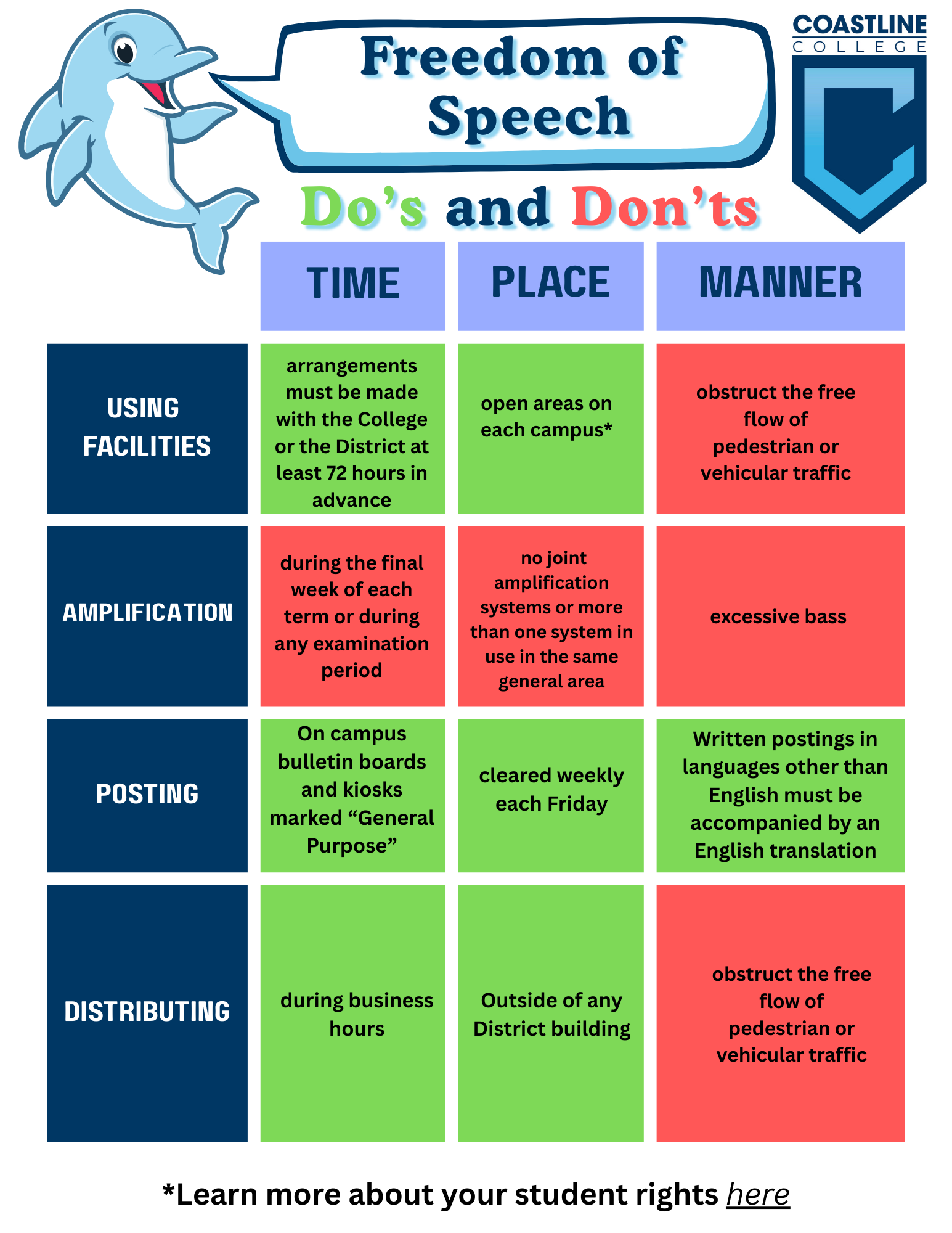
AP 3900 Speech is continued here: AP 3900 Speech: Time, Place, and Manner
-
Grade Grievances
Submit a Grade Grievance if you believe your overall grade for a course does not accurately represent your achievements in said course due to the instructor's mistake, fraud, bad faith, or incompetency.
Concerns about grades should be addressed as soon as possible in order to ensure availability of student and instructor records, and to permit time for a formal appeal, should one be necessary. Grade grievances will be permitted only through the end of the sixth week of the semester following the semester or summer session in which the grade was assigned.
All grade grievances will be handled through the student grievance process outlined in the sections below. However, in general and by law, the instructor is solely responsible for the grades he/she assigns. No instructor may be directed to change a grade except in certain narrow circumstances authorized by Education Code Section 76224(a), “When grades are given for any course of instruction taught in a community college, the grade given to each student shall be the grade determined by the instructor of the course and the determination of the student’s grade by the instructor, in the absence of mistake, fraud, bad faith, or incompetency, shall be final.”
For the purposes of this Article, grades may only be reviewed within the following narrow context, subject to ratification by student government organizations:
- Mistake:an unintentional act, omission or error by the instructor or the college. May include, but is not limited to, errors made by an instructor in calculating a student’s grade and clerical errors.
- Fraud:a deception deliberately practiced in order to secure unfair or unlawful gain. Fraud may exist when a grade is based upon some sort of dishonest activity, for example, selling grades.
- Bad Faith:an intent to deceive or to act in a manner contrary to law and/or a grade assigned because of a student’s protected characteristics as defined in Education Code Section 66270. If, pursuant to the discrimination and harassment complaint procedure, as delineated in Title 5, California Code of Regulations, Section 59300, it is determined that a grade was the result of discrimination or harassment, the grade may be changed as a remedy for the discrimination or harassment.
- Incompetency:a lack of ability, legal qualification, or fitness to discharge a required duty. A student may claim incompetency when he or she has evidence that the instructor has an impaired ability or fitness (due to accident or illness) to adequately judge the student’s performance.
Students who believe there is an issue with their grade, should follow these steps to seek a resolution:
- Step 1: Attempt to resolve the grade concern informally by discussing it directly with the instructor of the course.
- Step 2: If the issue is not resolved after discussing it with your instructor, escalate the concern to the respective academic dean. You may find their information here: Office of Instruction - Academic Deans
- Step 3: If you are still unsatisfied after Steps 1 and 2, you may file a formal grade grievance petition. This petition must be submitted before the end of the sixth week of the subsequent semester, following the semester or summer session in which the grade was assigned.
Please use this form to file a grade grievance.
https://cm.maxient.com/reportingform.php?CoastColleges&layout_id=24Who will see the report? Office of Student Services, Dean of Students
Who will follow up? Dean of Students
Meet the Team

Carlos Amescua, Ed.D.
- Director, EOPS/CARE/NextUp & CalWORKsStudent Services Center in Fountain Valley
- jamescua@cccd.edu
- (714) 241-6211

Morgan Kirk
- Manager, Basic Needs Program
- Student Services Center in Fountain Valley
- mkirk11@cccd.edu
- (714) 241-6024
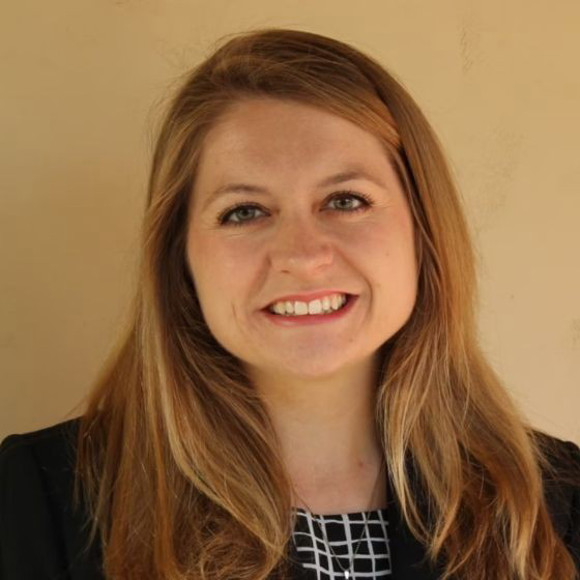
Alison Martell
- Acting Director, Student Leadership and Engagement
- Student Services Center in Fountain Valley
- acarlock@coastline.edu
- (714) 241-6134

Christina Oja, Ed.D.
- Acting Director, Student Equity and Title IX
- Student Services Center in Fountain Valley
- coja@cccd.edu
- (714) 241-6142
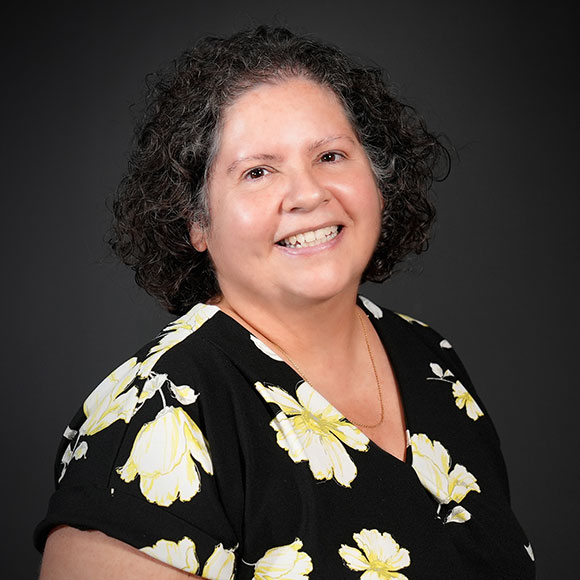
Claudia Vernon
- Director, Mental Health Services
- Student Services Center in Fountain Valley
- cvernon4@coastline.edu
- 714-241-6005

Maureen Schaller
Administrative Assistant to the Dean of Students
Welcome Message From The Dean of Students
Meet Dr. Leighia Moore-Fleming
Meet the Dean of Students, enjoy some delicious donuts, share your ideas, and ask questions at one or both events this semester.
Thursday, October 30, 2025 in the DSPS Conference Room #138, Newport Beach Campus, Newport Beach, CA from 10:00 - 11:00 AM
Monday, November 17, 2025 in the Student Lounge Room #103, Garden Grove Campus, Garden Grove, CA from 10:00 - 11:00 AM
Other Upcoming Events
Check out the Student Calendar for a full list of upcoming events!
Related Pages
Basic Needs Resources
Basic Needs at Coastline College includes food access, housing assistance, mental health services, hygiene products, student success supplies/equipment, transportation, and emergency funding. Basic needs services & resources are coordinated to serve and support students to be successful in your educational journey.

Health Services
Health Services are available to Coastline students at two locations. Learn about the scope of services, coverages and exclusions, flu shots, FAQs, and more.
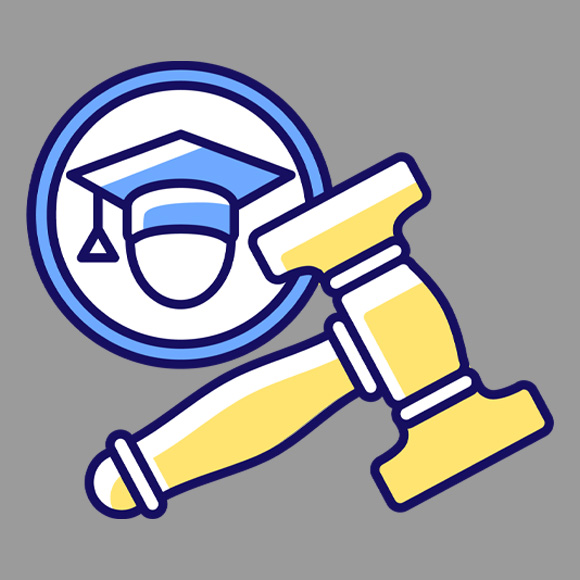
Associated Student Government (ASG) Get Involved!
The Associated Student Government (ASG) is the official voice of the student body at Coastline College. ASG is dedicated to representing and empowering the student body by fostering a vibrant, inclusive campus community.
Get In Touch
Maureen Schaller
Students Services Center Fountain Valley
8:00 AM - 5:00 PM
P: 714.241.6004





